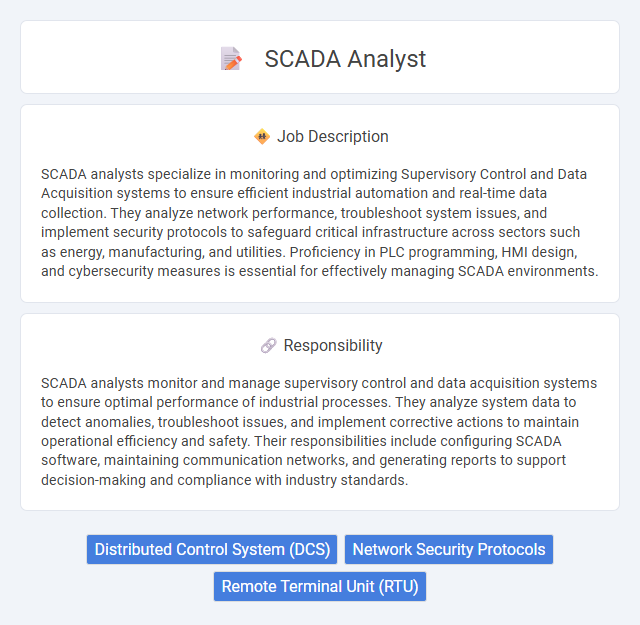
SCADA analysts specialize in monitoring and optimizing Supervisory Control and Data Acquisition systems to ensure efficient industrial automation and real-time data collection. They analyze network performance, troubleshoot system issues, and implement security protocols to safeguard critical infrastructure across sectors such as energy, manufacturing, and utilities. Proficiency in PLC programming, HMI design, and cybersecurity measures is essential for effectively managing SCADA environments.
Individuals with strong analytical skills and a keen eye for detail are likely suitable for a SCADA analyst role, as the job requires monitoring and diagnosing complex control systems. People who thrive in structured environments and can handle high-pressure situations may find this position aligns well with their strengths. Those who prefer dynamic problem-solving and working with advanced technology might also have a higher probability of success in this career.
Qualification
A SCADA analyst must possess strong technical skills in automation systems, including expertise in Supervisory Control and Data Acquisition (SCADA) software, network protocols, and industrial control systems. Proficiency in data analysis, cybersecurity measures, and troubleshooting communication between field devices and central systems is essential for maintaining efficient and secure operations. A background in electrical engineering, computer science, or related fields, along with certifications such as ISA/IEC 62443, enhances candidacy in this role.
Responsibility
SCADA analysts monitor and manage supervisory control and data acquisition systems to ensure optimal performance of industrial processes. They analyze system data to detect anomalies, troubleshoot issues, and implement corrective actions to maintain operational efficiency and safety. Their responsibilities include configuring SCADA software, maintaining communication networks, and generating reports to support decision-making and compliance with industry standards.
Benefit
A SCADA analyst will likely enhance operational efficiency by monitoring and analyzing control systems to detect and resolve issues promptly. This role may provide opportunities for career growth in industrial automation and data analysis fields. Employees could also benefit from gaining expertise that supports the optimization of critical infrastructure systems, potentially leading to higher job security and competitive compensation.
Challenge
The SCADA analyst position likely involves navigating complex control systems to ensure reliable monitoring and data accuracy in industrial environments. Challenges probably include quickly diagnosing system malfunctions and managing cybersecurity threats targeting critical infrastructure. Success in this role depends on balancing technical expertise with innovative problem-solving under pressure.
Career Advancement
SCADA analysts play a crucial role in monitoring and controlling industrial systems, with expertise in data acquisition, system integration, and cybersecurity. Career advancement opportunities include transitioning into roles such as SCADA engineer, automation engineer, or cybersecurity specialist, often requiring certifications in control systems and programming languages like Python or PLCs. Gaining experience with emerging technologies like IoT, AI-driven analytics, and cloud-based SCADA platforms further enhances prospects for leadership positions in industrial automation and smart infrastructure management.
Key Terms
Distributed Control System (DCS)
SCADA analysts specializing in Distributed Control Systems (DCS) manage and optimize automated industrial processes by monitoring real-time data and ensuring seamless communication between control units. They analyze system performance, troubleshoot issues, and implement configuration changes to enhance operational efficiency and reliability. Expertise in protocols like Modbus, Ethernet/IP, and OPC UA is crucial for integrating field devices and maintaining data integrity within the DCS network.
Network Security Protocols
SCADA analysts specialize in protecting industrial control systems by implementing robust network security protocols such as DNP3 Secure Authentication, IEC 62443 standards, and VPN encryption to safeguard against cyber threats. They continuously monitor network traffic using intrusion detection systems (IDS) and firewalls tailored for SCADA environments to detect anomalies and prevent unauthorized access. Expertise in configuring secure communication channels between field devices and control centers is essential to maintaining system integrity and operational continuity.
Remote Terminal Unit (RTU)
A SCADA analyst specializing in Remote Terminal Unit (RTU) management is responsible for monitoring and maintaining RTU devices that collect and transmit field data in industrial control systems. They analyze real-time data to detect anomalies, optimize RTU performance, and ensure seamless communication between field sensors and central control systems. Expertise in RTU configuration, telemetry protocols, and network diagnostics is essential for ensuring reliable data acquisition and system integrity.
 kuljobs.com
kuljobs.com